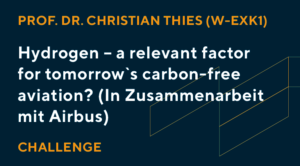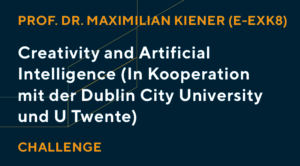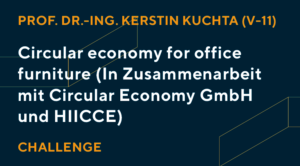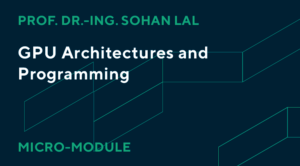Challenges
Challenges or Micro Modules are characterized by placing a real, relevant challenge from life at the center of students‘ learning. This teaching approach is closely related to the teaching methods of problem-based and project-based learning, which aims to motivate students internally. The purposeful, in-depth nature of learning and the proximity to everyday life prepares both learners and teachers for lifelong learning.
Find more Challenges and Micro-modules from all universities on the ECIU University Challenge platform.
As a TU-student, you can have all challenges credited with ECTS-points depending on their scope.

- 6 ECTS Points for successfully completing the challenge
- Application closed
Look behind the scenes of a great idea – designing scenarios for the refueling infrastructure and supply network in close cooperation with Airbus.
Hydrogen has great potential to contribute to the decarbonization of industry and transportation. One sector in which hydrogen is expected to play an important role is aviation. Aircraft manufacturers, airlines, and airports are developing new technologies and utilization concepts. Hamburg Airport, for example is preparing for the future use of hydrogen. But is it realistic to think that we are moving towards carbon-free aviation? What are the limiting factors? What ideas do you have for developing an efficient and reliable hydrogen supply system?

- 3 ECTS Points for successfully completing the challenge
- Application closed
Use your creativity to identify a challenge at the intersection of creativity and AI and act collaboratively on an interdisciplinary solution.
Artificial Intelligence (AI) can now write poems, produce artworks, draft business plans, play strategy games like chess or Go (and often better than humans), and solve scientific problems. For that reason, society is confronted with complex questions such as: Can AI be creative? To what extent does AI impact human creativity? What is creativity in the first place and how does it work? AI affords unforeseen creative possibilities. At the same time, AI raises multifaceted sociotechnical questions, ranging from human-machine interaction harms to mass unemployment and a new human self-understanding. Both exploring the potential of AI-powered creativity and finding solutions to the risks it generates requires experimentation and outside-the-box thinking. The seminar enables the participating students to use their collective creativity to identify a challenge at the intersection of creativity and AI and to collaboratively develop an innovative, interdisciplinary solution.

- 3 ECTS Points for successfully completing the challenge
- Application closed
Help to speed up the office furniture sector’s transition towards a circular and innovative economy.
In the office furniture sector, many resources are still being wasted and new office furniture is usually not designed for reuse, repair, refurbishment or recycling. At the same time, the way we work is changing rapidly and constantly and requires office furniture that is modular, adaptable and recyclable. Bringing our ideas together, we want to engage on this topic, trying to identifiy approaches and solutions that bring the biggest impact to a sustainable office furniture sector in Europe.

- Application closed
Providing you with hands-on experience in solving computationally intensive tasks faster and with lower energy consumption.
The course begins by providing a broad motivation for the design of multi- and many-core processors such as graphics processing units (GPUs). The first phase covers basic GPU concepts, including the evolution of GPU computing, a high-level overview of GPU architecture, and key differences from CPU architecture. Supplementary material is provided for students without a background in computer architecture fundamentals. Once a basic understanding is established, the module introduces the programming of GPUs using CUDA. The curriculum then delves into advanced concepts from both an architectural and programming perspective. To reinforce the theoretical knowledge gained in the lectures, students will engage in progressively more complex exercises throughout the module.